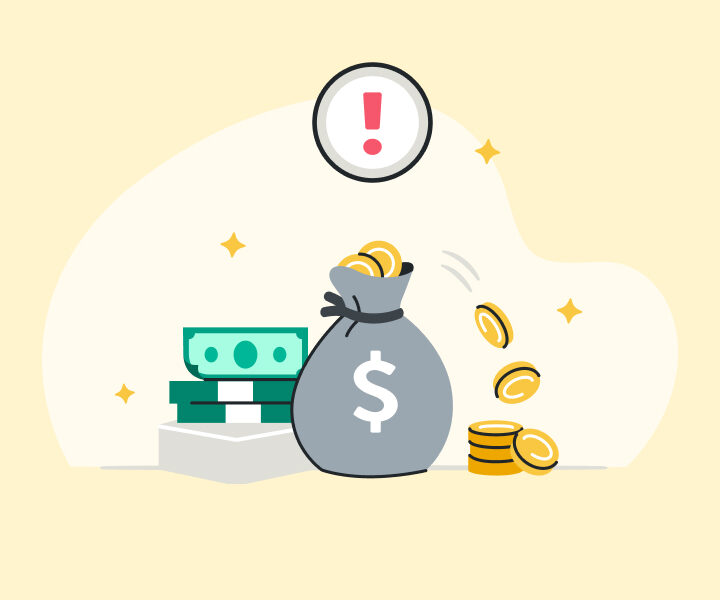Switch to TurboTax and File for just $60.
The Penalties for Filing Your Taxes Late and How to Mitigate Them
TurboTax Canada
February 5, 2025 | 4 Min Read

The Canada Revenue Agency (CRA) requires individual taxpayers to submit their income tax returns by April 30 every year, or the following business day if that date falls on a weekend or a holiday. Unfortunately, sometimes life happens, and you miss the filing deadline. If that’s the case, you only have a late filing penalty if you have a balance owing. If you owe on your taxes, you’ll also be charged a CRA penalty for missing the deadline.
No one wants to pay extra fees when it comes to taxes. To help, here’s some key information about your 2024 tax filing and what you need to know if you file late in Canada.
Key Takeaways
- Filing taxes late in Canada can result in penalties and interest charges from the Canada Revenue Agency (CRA). But not filing at all can affect refunds, benefits, and credits.
- You can file late returns online or through an accountant. But if you file late and taxes are owed, be prepared for increased amounts due.
- Explore options like form RC4288 for penalty and interest relief due to extraordinary circumstances or financial hardship.
When is the tax deadline for 2024 taxes?
For most people, the deadline for 2024 taxes is fast approaching—April 30, 2025. If you have taxes owing, you’ll want to file by that date to avoid penalties, and pay by that date to avoid interest.
Suppose you owe taxes and don’t pay your outstanding balance by April 30, 2025. In that case, you’ll be charged interest and penalties starting May 1, 2025.
Business owners and self-employed people must also pay their taxes by April 30, 2025—even though the self-employed tax return deadline is June 16. To avoid penalties if you have a balance due, you have to pay your amount in full by April 30 to avoid interest charges. So, getting a handle on your self-employed taxes early is a good move.
Can you file taxes after the deadline?
Yes, you can file your tax return after the deadline. If you’re due for a refund, however, there may be disruptions to receiving any credits or benefits you are entitled to.
What happens if you file your taxes late in Canada?
If you file your taxes late and owe money, you’ll incur penalties and interest—and any benefits or credits you qualify for might be disrupted. Specifically, here are some benefits that could be affected:
- The goods and services tax/harmonized sales tax (GST/HST) credit, including provincial or territorial credits
- The Canada child benefit (CCB), including provincial or territorial payments
- Old Age Security (OAS) benefits
If you file your taxes late and have no amounts owing, you won’t face any penalties, but you should still consider filing. Filing your income tax return, even if you don’t owe any taxes, has several benefits, including:
- Qualifying for a tax refund
- Qualifying for benefits like the GST/HST tax credit, CCB, or OAS
- Building Registered Retirement Savings Plan (RRSP) contribution room
- Receiving a Notice of Assessment (NOA) from the CRA, which you may need when applying for a loan or a mortgage
Is there a penalty for filing taxes late?
If you file your taxes late and owe money, the CRA charges you a penalty on the taxes owed. The first time you are late on your taxes, the CRA interest rate on your balance owing is 5%, plus an additional 1% percent for each month they’re late—up to 12 months. Subsequent late filing penalties are 10% added to the balance due, plus 2% per month until the return is filed—to a maximum of 20 months.
If the CRA charged you a late-filing penalty previously and requested a formal Demand for a Return, your late-filing penalty for 2024 will be 10% of your balance owing. You will be charged an additional 2% for each full month that you file after the due date, to a maximum of 20 months.
If you owe taxes for several different years, all of your payments are credited toward your oldest debts.
What penalties do you pay on late taxes if you’re self-employed or a small-business owner?
If you’re self-employed, a sole proprietor, or own your own business, you may need to file additional returns, like payroll and GST/HST remittances and withholdings. You also have a longer filing time for your self-employed income tax return, which is June 16. Still, if you end up with an amount owing, it is due on April 30, when the penalties and interest that we mentioned above start accumulating.
You’ll incur penalties and interest if you don’t file your payroll remittance on time. Payroll accounts have several penalties. If you don’t submit your payroll remittance on time, you’ll be charged a penalty of 10% for the first failure; and up to 20% for any additional failures.
The CRA takes the calculation, withholding, and submission of payroll source deductions seriously, since these deductions directly impact your employees.
As an employer, you must also remit annual information returns to the CRA regarding your employees. Filing this information late incurs a $10 per day penalty if you have fewer than 50 returns and significantly higher penalties if you have more employees.
If you collect GST/HST, penalties also apply for filing late. The CRA calculates the late filing fee for your GST/HST taxes using the formula A + (B x C).
In this formula, A is 1% of the amount you owe, B is 25% of A, and C is the number of months the return is late.
For example, if you owe $1,000 in GST/HST and submit your payment 3 months late, your penalty is $17.50: $10 + ($2.50 x 3).
Does the CRA charge interest on late instalments?
Yes, the CRA charges interest on late tax instalments. Tax instalments are payments you make throughout the year to cover taxes you typically pay as a lump sum on April 30 of the following year. The tax instalment dates for 2025 are:
- March 15
- June 15
- September 15
- December 15
Paying your taxes owing in instalment payments throughout the year typically affects only those who owed net tax of more than $3K in the prior year. For example, if your net tax owing was more than $3K, you may be required to make tax instalment payments in the following year.
If you did not make your instalment payments on time or didn’t pay enough, you’ll be charged CRA instalment interest at the prescribed interest rate, which updates every three months.
If your instalment interest charges are more than $1K, you’ll have to pay an instalment penalty equal to a flat rate of $1K or 25% interest, whichever is higher.
You can avoid your instalment interest and penalty charges by paying your instalments on time and paying more than is owed on your instalment payments.
How do I file late tax returns in Canada?
You can submit a late tax return using the same method you would to file your return on time. For your late tax return file, the CRA accepts both online tax-filing software and returns filed by an accountant. Remember that you’ll pay interest and penalties if you owe taxes, so your amount due may be higher than expected.
If you haven’t filed a tax return in several years, you should start by filing the oldest return first, because you may be able to take advantage of carry-forward amounts from previous years, including:
- Tuition, education, and textbook fees
- Net or non-capital losses
- Donations and gifts
- Registered Retirement Savings Plan (RRSP) contribution room
Are late-filing penalties tax deductible?
No, late-filing penalties are not tax deductible in Canada. However, if you need taxpayer relief, you have options.
You can apply to cancel or waive penalties and interest using form RC4288. You might be eligible if you have experienced a natural disaster or financial hardship. For example, if you were recently affected by a flood or fire, you could apply for tax relief due to extraordinary circumstances.
File with confidence
Get advice and answers as you go, with a final tax expert review before you file.
Get StartedWhen is the tax deadline for 2023 taxes?
What happens if you file your taxes late in Canada?
Is there a penalty for filing taxes late?
What penalties do you pay on late taxes if you’re self-employed or a small-business owner?
Does the CRA charge interest on late instalments?
Related articles

© 1997-2024 Intuit, Inc. All rights reserved. Intuit, QuickBooks, QB, TurboTax, Profile, and Mint are registered trademarks of Intuit Inc. Terms and conditions, features, support, pricing, and service options subject to change without notice.
Copyright © Intuit Canada ULC, 2024. All rights reserved.
The views expressed on this site are intended to provide generalized financial information designed to educate a broad segment of the public; it does not give personalized tax, investment, legal, or other business and professional advice. Before taking any action, you should always seek the assistance of a professional who knows your particular situation for advice on taxes, your investments, the law, or any other business and professional matters that affect you and/or your business.









